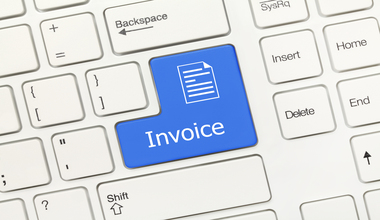
A digital invoice is enough – FALSE
According to tax regulations, an electronic invoice is an invoice (or a flow of invoices) that is created, transmitted, received, and stored in electronic format. Therefore, simply scanning an invoice is not enough to comply with the law. Starting in January 2024, businesses must accept electronic invoices. They have until 2026 to begin issuing them electronically as well. They must also structure the data contained in their invoices so that it can be processed consistently by all economic stakeholders and reproduced in clear language in case of an audit by the tax authorities.
I can destroy my original paper invoices – TRUE (under certain conditions)
Article 1379, introduced by Decree 2016-1673 of 5 December 2016, governs the validity of digital copies and allows you to destroy your original paper invoices. Once digitised, the original paper invoice no longer needs to be retained. However, the digital copy must meet certain requirements. To be considered valid, the digital copy must be identical in form and content to the original document, and its integrity must be permanently guaranteed by following a procedure that complies with the conditions established by the decree. The procedures for digitising paper invoices are defined by the order of 22 March 2017, pursuant to Article L. 102 B of the Book of Tax Procedures.
 The NF Z42-026 standard, launched in May 2017, specifies the conditions under which paper-based records must be digitised for the resulting digital file to be considered a faithful copy of the original document. It is a practical guide for accurate digitisation and complements the NF Z42-013 standard on electronic record management systems, which governs the integrity of the process.
The NF Z42-026 standard, launched in May 2017, specifies the conditions under which paper-based records must be digitised for the resulting digital file to be considered a faithful copy of the original document. It is a practical guide for accurate digitisation and complements the NF Z42-013 standard on electronic record management systems, which governs the integrity of the process.
To be valid, a digital copy must meet three requirements which together form what is known as a reliable audit trail: the copy must be identical to the original in colour, image and content, it must be stored in PDF or PDF A/3 format with a valid electronic signature, it must have a server stamp that adheres to the relevant regulations as well as a digital imprint (or equivalent) to ensure that the invoices are legible, available and unalterable during their legal retention period. Finally, it must contain all the information contained in the paper document.
If you want to opt for digital records management, you must ensure that your company complies with all these rules, otherwise it’s best to stick to paper records management. Before destroying paper invoices, make sure they are preserved and safely stored for at least ten years.
AGS Records Management is NF 544-certified and is therefore able to ensure the faithful and accurate digitisation of your documents. We can help you set up your digitisation projects.
My company is in the French Overseas Territories, so I don’t need to worry about mandatory electronic invoicing – FALSE… sometimes
From 1 January 2024, all companies must accept electronic invoices. They then have until 2026 to transition to issuing invoices electronically as well. This provision affects all French companies, including those in the departments of Martinique, Guadeloupe, and Reunion. Indeed, VAT applies in these three departments and companies located there are subject to VAT. The supply of services falls within the scope of electronic invoicing, while the supply of goods falls within the scope of electronic reporting (as it is an export).
On the other hand, companies established in French Guiana or Mayotte are exempt from electronic invoicing. You may, therefore, like companies outside of France, be obliged to transmit data if you carry out transactions deemed to be in France and subject to VAT, as defined by Article 290-II of the General Tax Code.
The regulation also applies to French companies with customers in other countries – TRUE
French companies with customers outside of France, whether in the European Union or outside the European Union, are subject to VAT and therefore also subject to the new e-invoicing regulations. These companies will be required to generate an e-report for the tax authorities.
I will still be able to send invoices to my customers in PDF format – FALSE
 Invoices saved as image-only pdfs (created either by scanning a paper invoice or using an office tool) will not be considered electronic invoices under the new regulation. An electronic invoice contains a minimum amount of data in a structured format that a PDF can’t transmit correctly.
Invoices saved as image-only pdfs (created either by scanning a paper invoice or using an office tool) will not be considered electronic invoices under the new regulation. An electronic invoice contains a minimum amount of data in a structured format that a PDF can’t transmit correctly.
You are allowed to use PDF invoices until 31 December 2027 while you transition to true electronic invoicing. However, you must be able to extract the data required by the tax authorities.
An electronic invoice is legally compliant if it has an electronic signature (through a qualified electronic certificate) and a reliable audit trail (linking the invoice to the delivery of goods and services). These features guarantee that the invoice is authentic and that its content (which cannot be modified) is legible and true.
An electronic invoice can also take the form of a message structured according to a secure agreed-upon standard that can be read by computer. Examples include Enterprise Resource Planning (ERP), Electronic Data Interchange (EDI), XML format, an email with a PDF file attached, and a fax received in electronic form. Law 2000-23 of 13 March 2000 recognises the evidential value of a written document in electronic form.
I am free to choose my digitisation solution – TRUE
You can send data from e-reporting transactions to the tax authorities via one of the digitisation platforms partnered with the administration (PDP) or via the public invoicing portal Chorus Pro. The certified private platforms will have to extract the data expected by the tax authorities from the invoices.
My electronic invoices must all be in the same format – FALSE
The operators of partner digitisation platforms and the public invoicing portal can send electronic invoices in three formats:
- The Cross Industry Invoice (CII) format
- The Universal Business Language (UBL) format
- The mixed format consisting of a structured data file in XML format and a PDF file.
I can entrust the storage of my paper and electronic invoices to a third-party records manager – TRUE
To guarantee that your electronic invoices are efficiently managed and stored, you can use the services of a third-party records management company or switch to electronic records management. Outsourcing can be a way to minimise costs while achieving compliance. AGS Records Management provides you with pre-sales engineers who create a framework for your entire records management project and ensure its successful completion. You don’t need to be a technical expert on electronic invoicing because AGS Records Management brings the experience and expertise required.
I can use my EDM system to store my electronic invoices – FALSE
Electronic documents with legal value, such as invoices or payslips, require special care. The law requires that you store these documents in conditions that guarantee their:
- Integrity, i.e., they cannot be altered
- Security, in terms of access, hosting, and confidentiality
- Durability, i.e., they must remain usable over time
- Traceability, i.e., their life cycle must be able to be reconstructed
- Accessibility, they must be available to and easily retrievable by authorised users while remaining confidential to all other users.
The Electronic Archiving System (EAS) or Electronic Vault, is the only technical solution capable of ensuring all these aspects and, therefore, of reliably maintaining document authenticity.
I must find a digitisation solution now – TRUE AND FALSE
Legally, you could wait until 1 January 2024 to find a digitisation solution. However, as with any project, you should consider the time it will take to implement, the training required, the organisational changes needed, and the budgets to be allocated. AGS Records Management can assist you in this process and greatly simplify your life! Start preparing now to streamline and secure your invoicing processes with our WiDO@FACT solution.
Electronic invoicing will be a real headache – FALSE
 This regulation aims to simplify the day-to-day work of your financial department and will make it much easier to reconcile invoices, purchase orders and delivery notes through automation. AGS Records Management estimates that, on average, you’ll spend 30% less time processing customer invoices while saving 66% on processing costs.
This regulation aims to simplify the day-to-day work of your financial department and will make it much easier to reconcile invoices, purchase orders and delivery notes through automation. AGS Records Management estimates that, on average, you’ll spend 30% less time processing customer invoices while saving 66% on processing costs.
The regulation makes your business more competitive by reducing the administrative burden of invoice management. It also secures business relationships by accurately monitoring the progress of invoice processing, resulting in fewer disputes over payment deadlines. For the French tax authorities, the regulation makes it easier to combat VAT fraud thanks to automated cross-checks between purchases and sales.
When it comes to implementing your e-invoicing solution, simplicity is essential. With the support of specialists like AGS Records Management, this legal obligation does not have to be restrictive. As a long-standing specialist in the field of records management and digital transformation, AGS Records Management is experienced in working with clients from every sector, and we will fully tailor our service offering to your specific needs.
The regulation affects all transactions – FALSE
Electronic invoicing concerns all transactions involving the purchase and sale of goods and/or services between VAT-registered companies established in France, provided they concern the national territory. Transactions exempt from VAT under the provisions of Articles 261 to 261 E of the General Tax Code, and therefore exempt from invoicing, are also exempt from the new regulations concerning electronic invoicing. These include health services (Article 261, 4, 1°), education and training services (Article 261, 4, 4°), real estate transactions (Article 261, 5), transactions carried out by non-profit associations (Article 261, 7), banking and financial transactions, and insurance and reinsurance transactions (Article 261C).
The regulation only concerns invoicing – TRUE
The scope of the regulation governing electronic invoicing is limited to transactions that incur VAT and are conducted between VAT-registered companies that: are established in France, are subject to French invoicing rules, and generate invoices containing all the compulsory legal information required on an invoice (except for specific exceptions). Documents other than invoices are not covered by the scheme.
I can anticipate the electronic invoicing obligation – TRUE
 SMEs can anticipate the 2026 deadline for issuing electronic invoices. The timetable for e-reporting is the same as that for e-invoicing. However, early entry into the e-invoicing system has no effect on the obligation to transmit e-reporting data. Your company can enter into e-reporting separately as long as it does so no later than the date on which the applicable system enters into force.
SMEs can anticipate the 2026 deadline for issuing electronic invoices. The timetable for e-reporting is the same as that for e-invoicing. However, early entry into the e-invoicing system has no effect on the obligation to transmit e-reporting data. Your company can enter into e-reporting separately as long as it does so no later than the date on which the applicable system enters into force.
Contact AGS Records Management to prepare your electronic invoicing.







